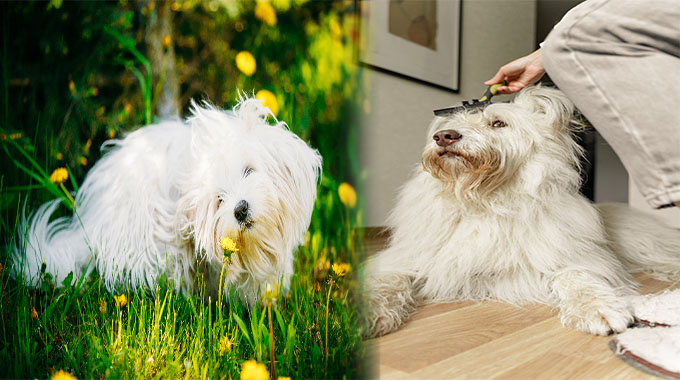When it comes to taking care of our animal companions, natural remedies and holistic grooming techniques can promote their overall well-being. From alleviating common ailments to keeping their coats shiny and healthy, there are several ways we can incorporate natural approaches into our pet grooming routine. In this article, we will explore some effective natural remedies and grooming tips that you can easily apply at home.
1. Natural Remedies for Common Ailments
a. Skin Irritations: For pets with skin irritations or allergies, try using a solution of diluted apple cider vinegar. Apply it topically to the affected area to help soothe and reduce itchiness.
b. Ear Infections: A mixture of equal parts apple cider vinegar and water can also be used as an ear cleaner. Gently apply the solution and wipe away any debris to help prevent and alleviate ear infections.
c. Fleas and Ticks: Essential oils such as lavender, eucalyptus, and cedarwood have natural insect-repellent properties. Dilute a few drops of your chosen oil in water and spray it on your pet’s fur to repel fleas and ticks.
d. Digestive Issues: Adding a small amount of pureed pumpkin or natural probiotics to your pet’s diet can help with digestive problems and regulate their gut health.
2. Holistic Grooming Tips
a. Brushing: Regular brushing not only keeps your pet’s coat looking beautiful but also helps distribute natural oils and stimulates blood circulation. Use a brush suitable for your pet’s fur type and start from the roots, working your way to the tips.
b. Bathing: Choose natural or organic shampoos specially formulated for pets. Avoid products that contain harsh chemicals, as they can strip away the natural oils from their skin and coat. Bathe your pet only when necessary, as excessive bathing can dry out their skin.
c. Dental Care: Dental hygiene is essential for your pet’s overall health. Use pet-safe toothpaste and a soft-bristled toothbrush to brush their teeth regularly. Additionally, dental chews and toys can help remove plaque and freshen their breath.
d. Nail Care: Regularly trim your pet’s nails to prevent discomfort and potential injury. Use pet-specific nail clippers and be cautious not to cut too close to the quick, as it can cause bleeding.
e. Ear Care: Clean your pet’s ears gently using a natural ear cleaning solution or a saline solution. Use a cotton ball to wipe away any dirt or debris, making sure to avoid inserting anything deep into the ear canal.
3. Creating a Holistic Environment
a. Healthy Diet: Provide your pet with a balanced and nutritious diet, using high-quality, natural ingredients. Consult with a veterinarian to determine the appropriate diet for your pet’s specific needs.
b. Regular Exercise: Engage your pet in regular exercise to keep them physically and mentally stimulated. Consider activities like daily walks, playtime, and interactive toys to prevent boredom and maintain their overall well-being.
c. Stress Management: Pay attention to your pet’s emotional well-being. Provide a calm and comfortable environment where they can relax and ensure they have a dedicated space to retreat to when they need alone time.
d. Holistic Approaches: Explore holistic therapies like acupuncture, herbal remedies, and massage, which can help support your pet’s overall health and address specific concerns. Consult with a holistic veterinarian to determine the best approach for your pet.
By incorporating natural remedies, following holistic grooming tips, and creating a nurturing environment, you can promote your pet’s well-being while relieving common ailments and maintaining a healthy coat. Remember to consult with a veterinarian, especially for any specific health concerns or before introducing new treatments. With these holistic approaches, you can provide your beloved animals with the care they deserve, promoting their overall health and happiness.











